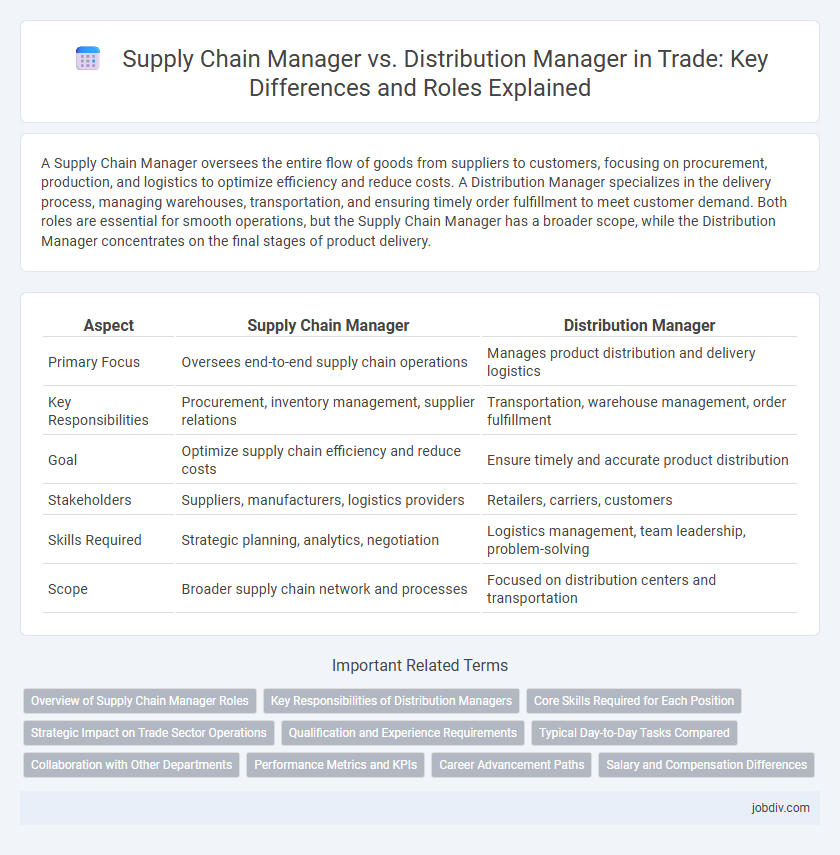A Supply Chain Manager oversees the entire flow of goods from suppliers to customers, focusing on procurement, production, and logistics to optimize efficiency and reduce costs. A Distribution Manager specializes in the delivery process, managing warehouses, transportation, and ensuring timely order fulfillment to meet customer demand. Both roles are essential for smooth operations, but the Supply Chain Manager has a broader scope, while the Distribution Manager concentrates on the final stages of product delivery.
Table of Comparison
| Aspect | Supply Chain Manager | Distribution Manager |
|---|---|---|
| Primary Focus | Oversees end-to-end supply chain operations | Manages product distribution and delivery logistics |
| Key Responsibilities | Procurement, inventory management, supplier relations | Transportation, warehouse management, order fulfillment |
| Goal | Optimize supply chain efficiency and reduce costs | Ensure timely and accurate product distribution |
| Stakeholders | Suppliers, manufacturers, logistics providers | Retailers, carriers, customers |
| Skills Required | Strategic planning, analytics, negotiation | Logistics management, team leadership, problem-solving |
| Scope | Broader supply chain network and processes | Focused on distribution centers and transportation |
Overview of Supply Chain Manager Roles
Supply Chain Managers oversee the end-to-end flow of goods, ensuring efficient procurement, production, and delivery processes to optimize cost and time. They coordinate with suppliers, manufacturers, and logistics providers to maintain inventory levels, forecast demand, and implement supply chain strategies. Their role is critical in enhancing supply chain visibility, reducing risks, and improving overall operational efficiency within trade networks.
Key Responsibilities of Distribution Managers
Distribution Managers oversee the efficient delivery of products from warehouses to end customers, ensuring optimal inventory levels and timely order fulfillment. They coordinate transportation logistics, manage distribution centers, and handle shipment scheduling to minimize delays and costs. Their core responsibilities include supervising warehouse staff, tracking performance metrics, and maintaining compliance with safety and regulatory standards in the supply chain process.
Core Skills Required for Each Position
Supply Chain Managers require expertise in demand forecasting, inventory optimization, and supplier relationship management to ensure seamless production and delivery processes. Distribution Managers focus on logistics coordination, warehouse operations, and transportation management to optimize the movement of goods from warehouses to end customers. Both roles demand strong analytical skills, proficiency in supply chain software, and leadership capabilities for effective team management.
Strategic Impact on Trade Sector Operations
Supply Chain Managers optimize procurement, production, and logistics to reduce costs and improve efficiency, directly influencing supply chain resilience in the trade sector. Distribution Managers focus on the execution of product delivery, ensuring timely and accurate order fulfillment to maintain customer satisfaction and market competitiveness. The strategic impact of these roles lies in balancing cost management with service quality, enabling smoother trade operations and stronger supplier-retailer partnerships.
Qualification and Experience Requirements
Supply Chain Managers typically require a bachelor's degree in supply chain management, logistics, or business administration, along with 5-7 years of experience in procurement, inventory control, and supplier relations. Distribution Managers often need a background in logistics or transportation management, with 3-5 years of experience overseeing warehouse operations, order fulfillment, and delivery scheduling. Both roles benefit from certifications such as APICS Certified Supply Chain Professional (CSCP) or Certified in Production and Inventory Management (CPIM) for enhanced career prospects.
Typical Day-to-Day Tasks Compared
Supply Chain Managers coordinate procurement, production planning, and logistics to ensure smooth operations across the entire supply chain, often analyzing demand forecasts and managing supplier relationships. Distribution Managers focus on overseeing warehousing, transportation, and delivery processes to optimize the distribution network and meet customer service levels. While Supply Chain Managers emphasize strategic sourcing and inventory control, Distribution Managers prioritize order fulfillment efficiency and transportation scheduling.
Collaboration with Other Departments
Supply Chain Managers coordinate with procurement, production, and logistics teams to ensure seamless inventory flow and demand forecasting accuracy. Distribution Managers work closely with sales, warehouse, and transportation departments to optimize delivery schedules and customer satisfaction. Both roles require strong interdepartmental collaboration to align supply chain efficiency with distribution effectiveness.
Performance Metrics and KPIs
Supply Chain Managers track KPIs such as inventory turnover, order accuracy, and supply chain cycle time to optimize end-to-end processes, while Distribution Managers focus on delivery performance, warehouse efficiency, and transportation costs to ensure timely order fulfillment. Performance metrics for Supply Chain Managers emphasize demand forecasting accuracy and supplier reliability, whereas Distribution Managers prioritize on-time delivery rates and distribution center throughput. Both roles utilize data-driven insights to enhance operational efficiency but target distinct points in the logistics value chain.
Career Advancement Paths
Supply Chain Managers typically advance by developing expertise in logistics, procurement, and operations strategy, positioning themselves for roles like Director of Supply Chain or VP of Operations. Distribution Managers often progress by specializing in warehouse management, transportation, and inventory control, leading to careers as Distribution Directors or Logistics Managers. Both career paths benefit from certifications such as APICS CPIM or CSCMP SCPro to enhance strategic decision-making and leadership skills.
Salary and Compensation Differences
Supply Chain Managers typically earn a higher salary than Distribution Managers, with average annual compensation ranging from $85,000 to $120,000 compared to $60,000 to $90,000 for Distribution Managers. The broader scope of responsibilities for Supply Chain Managers, including procurement, logistics, and inventory management, justifies their higher pay. Performance bonuses and benefits packages also tend to be more substantial at the Supply Chain Manager level due to their strategic role in optimizing operations and reducing costs.
Supply Chain Manager vs Distribution Manager Infographic

 jobdiv.com
jobdiv.com